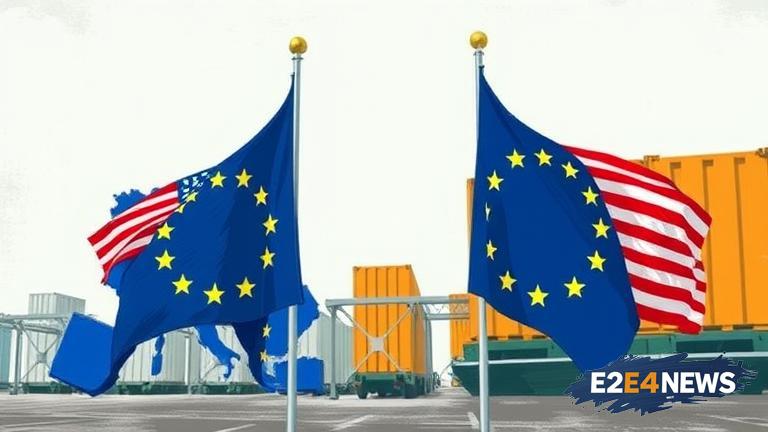The European Union has announced that it will be delaying its planned retaliation against US tariffs for a period of six months. This decision comes as a surprise to many, given the ongoing trade tensions between the EU and the US. According to CNBC, the EU’s decision to postpone its retaliation is a strategic move aimed at easing trade tensions and potentially paving the way for future negotiations. The US had previously imposed tariffs on EU goods, citing national security concerns and unfair trade practices. The EU had been preparing to retaliate with its own set of tariffs on US goods, but has now decided to hold off on implementing these measures. This delay is seen as a positive development by many, as it could help to reduce trade tensions and prevent a further escalation of the trade war. The EU’s decision to delay its retaliation is also seen as a sign of the bloc’s commitment to finding a negotiated solution to the trade dispute. The US and EU have been engaged in a series of trade negotiations, with the goal of reaching a new trade agreement that addresses the concerns of both parties. The delay in retaliation gives both sides more time to work towards a negotiated solution, and could potentially lead to a more favorable outcome for both the US and EU. The trade tensions between the US and EU have been ongoing for several years, with both sides imposing tariffs on each other’s goods. The US has imposed tariffs on EU goods such as steel and aluminum, while the EU has retaliated with tariffs on US goods such as bourbon and motorcycles. The trade war has had a significant impact on businesses and consumers on both sides of the Atlantic, with many companies facing increased costs and reduced demand. The delay in retaliation is seen as a welcome development by many businesses, which have been calling for a reduction in trade tensions. The EU’s decision to delay its retaliation is also seen as a sign of the bloc’s commitment to upholding the rules-based international trading system. The World Trade Organization (WTO) has been working to resolve the trade dispute between the US and EU, and the delay in retaliation could potentially give the WTO more time to find a solution. The trade tensions between the US and EU have also had a significant impact on the global economy, with many countries facing reduced trade and investment. The delay in retaliation could potentially help to reduce the impact of the trade war on the global economy, and could lead to increased trade and investment in the future. The EU’s decision to delay its retaliation is a complex issue, with many different factors at play. The bloc’s commitment to finding a negotiated solution to the trade dispute is seen as a key factor in the decision to delay retaliation. The US and EU have a long history of trade cooperation, and the delay in retaliation could potentially pave the way for a new era of cooperation. The trade war has also had a significant impact on the US and EU’s relationships with other countries, with many countries facing reduced trade and investment. The delay in retaliation could potentially help to reduce the impact of the trade war on these relationships, and could lead to increased cooperation and trade in the future. The EU’s decision to delay its retaliation is seen as a positive development by many, and could potentially lead to a more favorable outcome for both the US and EU. The delay gives both sides more time to work towards a negotiated solution, and could potentially reduce the impact of the trade war on businesses and consumers. The trade tensions between the US and EU are ongoing, but the delay in retaliation is seen as a step in the right direction. The EU’s commitment to finding a negotiated solution to the trade dispute is seen as a key factor in the decision to delay retaliation, and could potentially lead to a more favorable outcome for both sides.





